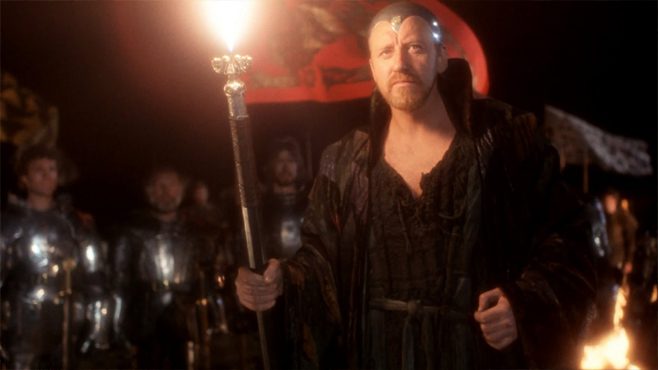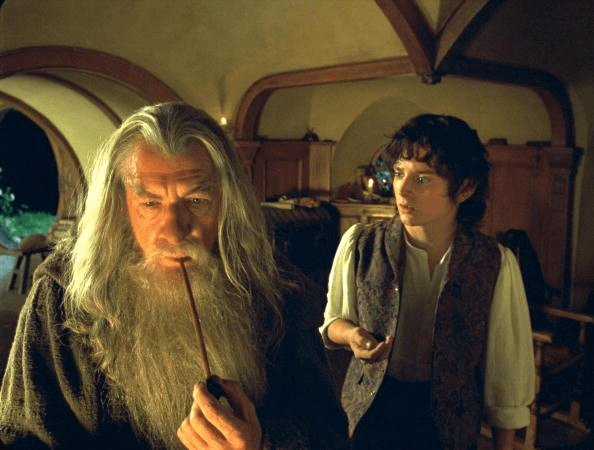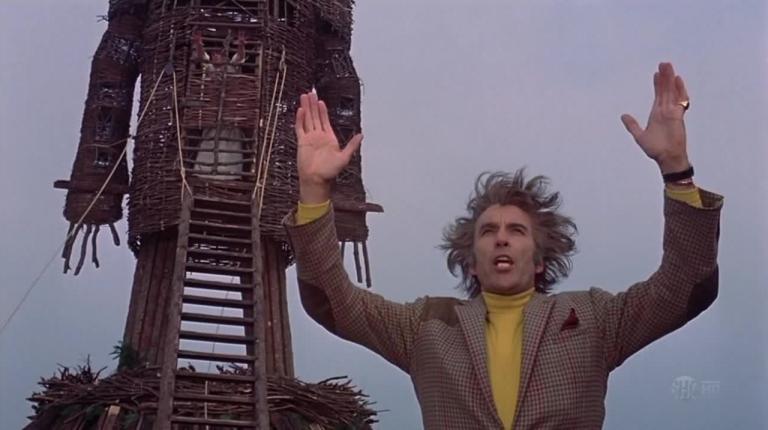We’ve covered some important stuff in the last couple weeks. I’m a pretty serious-minded writer, but sometimes even I need a break. Here’s something fun for a change.
No one is going to mistake any of the movies on this list for great works of Pagan theology or how-to videos on witchcraft. But if you’re feeling a bit too mundane and you need some magical motivation, give one of these a try. They’re fun and entertaining, but they all have something in them that reminds you that magic is real. Or at least, that’s what they do for me.
So, in no particular order…
Movies to inspire your magic
Excalibur (1981). Has there ever been a better wizard on film than Nicol Williamson’s Merlin? Yeah, I know – some of you prefer another wizard. He’s listed below, and he’s pretty good. But give me this Merlin any day. He’s powerful (but not invulnerable), wise (but he still makes mistakes), and he’s just a bit crazy. I’ll never be Gandalf, but if I work at it I can be Merlin.
The movie is a fairly straightforward (but not entirely faithful) retelling of the Arthurian legend. It’s a pleasure to watch. Many of the actors would go on to become huge stars, including Helen Mirren, Liam Neeson, and Patrick Stewart.
If there’s a down side, it’s all the people who come into Druidry expecting to learn the Charm of Making. Or worse, badly pronouncing the words of the charm and getting upset when it doesn’t do anything.
On the good side, the land and the king are one!

The Craft (1996). I was a baby Pagan when The Craft came out so I couldn’t wait to see it, even though I knew I was far older than its target audience. I loved the first two-thirds of the movie and hated the final third. I used to say “Nancy had a cosmic smackdown coming, but she didn’t deserve that.” After a lot more years of magical practice, I now say “Nancy didn’t deserve that, but when you don’t respect spiritual forces, these things happen.”
Jason Mankey says The Craft Didn’t Change Everything and he’s probably right. But the story of a young witch coming into her power is inspiring, no matter how old you are. We may not be able to change our eye color or levitate off the floor, but we can do things that matter a lot more.
Practical Magic (1998). I normally avoid “chick flicks” like the plague, but I’ll gladly put up with the romance to watch the magic in Practical Magic. How many of us have tried to be Sally Owens, hiding our power to make ourselves less threatening to our neighbors? And how many of us really want to be Aunt Frances and Aunt Jet, who let you know exactly who and what they are? I borrowed one of their best lines for a blog post title a couple years ago: “You can’t practice witchcraft while you look down your nose at it!”
Conan the Barbarian (1982). This was Arnold Schwarzenegger’s first big role – his accent is still strong but he’s not hard to understand. It’s full of magic, from Thulsa Doom’s snake cult to the shape-shifting witch to the wizard Akiro’s spells to heal the injured Conan. And perhaps the best of all, the late and timely appearance of Sandahl Bergman’s Valeria: “do you want to live forever?”
And there is wisdom in the Riddle of Steel: “Steel isn’t strong, boy, flesh is stronger … What is steel compared to the hand that wields it?”
The 1984 sequel Conan the Destroyer was a disappointment, while the 2011 remake rewrote the good parts and kept the bad ones. Both were hampered by the studio’s demand for a PG-13 rating, as opposed to the R rating of the original.
The original is the only one worth watching. It’s even been made into a musical (sort of).
The Mummy (1999) and The Mummy Returns (2001). These movies aren’t the best introduction to Egyptology, although by Hollywood standards they’re not bad. They’re on my list because they’re fun to watch, they’re a reminder that the past influences the present (even if we aren’t reincarnations of Egyptian princesses), and they make it very clear that magic doesn’t depend on belief or intention. Magic depends on action, so don’t read aloud from the book if you don’t understand what you’re doing.
The third installment (2008’s Tomb of the Dragon Emperor) didn’t live up to the first two, and this year’s Tom Cruise version was awful. After you finish these two, go back to the 1932 original with Boris Karloff.
The Lord of the Rings: The Fellowship of the Ring (2001), The Two Towers (2002), and The Return of the King (2003). What can I say about these movies that hasn’t already been said? They’re visually beautiful, filled with fascinating and relatable characters, and they have a storyline that grows more and more relevant every day.
What Pagan wouldn’t like to live in Middle Earth, whether with the hobbits, dwarves, elves, or men? And while Gandalf’s wizardry is far beyond what I’ll ever be able to do, he remains an ideal for which to strive. Perhaps most importantly, The Lord of the Rings presents a world where magic seeps from the very land itself… and it reminds us that our land is magical too.
If I have one complaint, it’s that they’re so long I rarely sit down to watch them. But if I catch them on TV, I’ll stop and watch for as long as I have.

Pirates of the Caribbean: The Curse of the Black Pearl (2003), Dead Man’s Chest (2006), and At World’s End (2007). I wrote about these movies in more detail in my review of the most recent installment Dead Men Tell No Tales. As with The Lord of the Rings, they’re a reminder that magic infuses our world. Most times we have to pay close attention to see it, but other times the magic smacks us upside the head.
“You best start believing in ghost stories, Miss Turner. You’re in one.”
They’re full of magic: the curse of the Aztec gold, Jack’s compass, Tia Dalma’s witchcraft (I would almost live in a swamp to have her cabin), Jack’s bargain with Davy Jones, the nine pieces of eight, Calypso, and the still-beating hearts. “What would Jack do?” is good advice for getting yourself out of a bad situation, whether you’re using magic or not.
Gordon White of Rune Soup calls the Pirates films “the best depictions of western magic ever committed to celluloid.” Elizabeth Swann’s “what shall we die for?” speech never fails to move me to tears. It’s one of the best examples of bardic magic on film.
Almost but not quite
The Mists of Avalon (2001). I read The Mists of Avalon fairly early on my Pagan journey and loved it. The Neopagan, feminist retelling of the Arthurian legend connected with me on multiple levels. So when TNT turned it into a short miniseries (running time without commercials: 3 hours 3 minutes) I made plans to watch it. The cast was great, the finished product was good, and I enjoyed it.
But too much was cut from the book, including my favorite scene where the married-off-into-exile Morgaine rediscovers her priesthood and begins the long journey to relearn what she’s forgotten. And the more my own Pagan journey has progressed, the less the generic Neopagan religion of the book speaks to me.
The book is great and the film is good, but neither provide the inspiration of the movies in the first section.
Elektra (2005). This is a comic book movie, and I’ve never been a comic book guy. But I liked Daredevil (2003), and the allure of Jennifer Garner in that red costume was too much for me to pass up. I liked it, and not just for that. I enjoyed Elektra as a mystical assassin with a conscience. I enjoyed the shape-shifting bad guys with their magical attacks. And I really enjoyed Terence Stamp as Stick, the blind martial arts master.
If I catch Elektra on TV I’ll stop and watch it, though it’s not on very often. It usually inspires me to pick up my exercise routine, and it makes me think about re-starting my weapons practice (though I still haven’t). But while it inspires me to think about magic, it never inspires me to work on magic.
Love them but not for this
The Harry Potter movies (2001 – 2011). I love Harry Potter. I read all the books and attended a couple of midnight release parties – I read Tarot for kids at one of them. I saw all the movies, own all the movies, and watch them regularly. I’m jealous that Jason Mankey got to visit The Wizarding World of Harry Potter before I did. I’m a proud Ravenclaw.
There are some scenes that have stuck with me over the years. Harry pleading with the Sorting Hat not to put him in Slytherin. Hermione punching Draco. Dumbledore’s speech on the death of Cedric Diggory. The flight on broomsticks through London. The Unbreakable Vow. Neville beheading the snake. And the final battle between Harry and Voldemort.
But Harry Potter never motivates me to actually work magic. For all the real magical references J.K. Rowling worked into the books, and for all the very real, very dark themes in the later books and movies, they’re so fantastic I can’t take them seriously.
But I still love watching them.
The Wicker Man (1973). Let’s face it: The Wicker Man isn’t exactly the best publicity for Paganism. But as with all these movies, it’s fun to watch. I love the idea of a modern village where everyone is Pagan, where Pagan rituals and celebrations are part of the common life, and where Pagan beliefs and morals are seen as normal. And I don’t think I’m alone in enjoying seeing the tables turned on the dominant (and at times, domineering) religion and culture. Sergeant Howie didn’t really deserve to go up in flames, but it’s nice to see Pagans on the non-burning end of the fires for a change. We all like winning.
But there’s no magic in The Wicker Man – everything has a strictly this-world explanation. And while Christopher Lee’s Lord Summerisle is a memorable character, he’s not exactly ethical.
The 39-years-in-the-making sequel The Wicker Tree isn’t nearly as good. And the 2006 remake with Nicholas Cage is an abomination.
So if you want an entertaining evening, pour yourself a dram of your favorite single malt and sit down with The Wicker Man. But don’t expect to get up energized about your magic.

I hate this one
Hocus Pocus (1993). I know a few Pagans and witches who love Hocus Pocus. If you like it, I won’t hold it against you. I hate it. Bette Midler, Sarah Jessica Parker, and Kathy Najimi embody all the negative stereotypes of witches: ugly and evil, kidnapping children to kill them, and stupid. Especially stupid. There’s an uncomfortable emphasis on virginity. It’s set in Salem, and it uses the names of some real people from the period of Witch Trials.
The only redeeming factor in this movie is demonstrating the protective use of salt.
To be fair, I don’t like farcical comedies – take out the offensive elements and I still wouldn’t like it. But witchy or not, if I want magical inspiration, this is the last movie I want to watch.















